Ready to learn more?
Get all the details straight to your inbox!
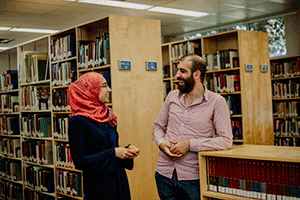
The Luther Library has over 24,000 items in its collection, 5,000 books checked out per year, and 7,000 students who come through its door per month.
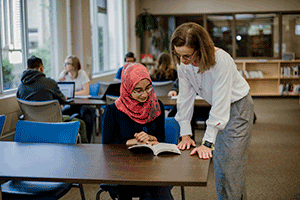
Luther College is recognized for its high standards of teaching, focused research, and one-on-one academic advising. We value and protect this heritage of excellence in scholarship, freedom of inquiry, and faithful seeking after truth.

Luther students can register in Arts, Science, or Media, Art, and Performance. Luther students are U of R students and receive a U of R degree.

Wondering where to live? Our student residence, The Student Village at Luther College, is considered a great choice for first-year student accommodation. Individual private rooms mean you can stick to your own schedule and you never have to deal with roommate hassles.
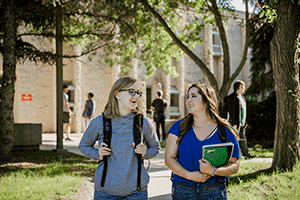
Luther College is a great choice for high school to university transition. Enjoy all the benefits of a larger campus, without feeling lost in the crowd. Our community is full of caring mentors and peers to ensure a positive student experience.
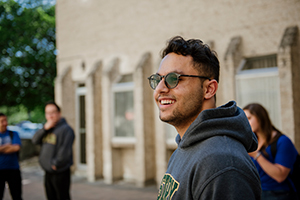
Every degree program at Luther College offers a study abroad option and an optional experiential learning component where you gain real world experience and get paid while going to school!
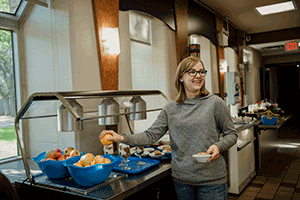
Living in The Student Village at Luther College, our student residence, comes with a choice of healthy, nutritious meal plans. That means no grocery shopping, no meals to cook, and no dirty dishes to worry about. You can focus on your studies and wellness!
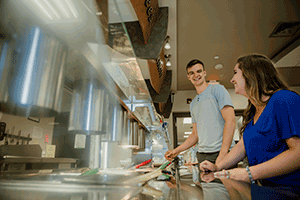
Eating better means studying better. The Luther Cafeteria offers fresh, healthy, nutritious meals seven days a week with a self-serve “all-you-care-to-eat” concept students prefer.
Get all the details straight to your inbox!
By Mary Vetter
Ask anyone about the work of a university and you will get two answers: teaching and research. But if you look at how universities describe themselves—and how they evaluate their professors—you will see three: teaching, research, AND community service and engagement. The motto of the University of Regina, for example, is “as one who serves”. Why do universities rank community engagement as such an important part of their raison d’être? One reason, of course, is that universities want to give back to the communities that support them. Another is just the sheer joy derived from sharing what you love. But in recent years, many academics have begun to speak about a “Scholarship of Engagement”, a concept which argues that service to and engagement with the community is a scholarly activity—and therefore part of the natural duty of education institutions—in the same way that teaching and research are. This edition of Impetus clearly demonstrates how engagement with the community and learning from the community is scholarship.
The Luther Lecture was “established with the purpose of making a distinctive and stimulating contribution to the life of the University and the general community.” This year’s 36th Luther Lecture, given by Senator Lillian Dyck, beautifully fulfilled that mandate. In her reflection on the Lecture, Dr. Brenda Anderson states “Senator Dyck provided us with a type of knowledge not typically accessed through academic lectures…a very old kind of knowledge, the knowledge of narrative, of story-telling…Such an exchange holds potential for ever-widening circles of knowledge, healing and transformation.” These latter words describe the way that universities traditionally think about the goals of their classroom teaching, but these insights came from Senator Dyck’s recounting of her personal story. Dr. Anderson goes on to describe how Senator Dyck’s reflection on how the lessons of the medicine wheel applied to pedagogy leads us to realize a deeper level of learning and understanding. Jenna Tickell, reflecting on the Luther Lecture “as a Métis woman and as a university student” explains how Senator Dyck “educated me regarding her personal history while at the same time empowered my activism and sense of self-discovery.” Ms. Tickell describes “the common phenomenon of the absent identity amongst mixed race Aboriginals” and asks “Can we teach stories like Senator Dyck’s as part of our history curriculum”?
Dr. Noel Chevalier’s address to the Fall 2011 convocation asserts that the value of a liberal arts education is in “challenging status quos and structures” in the communities with which we engage. Describing the pervasive assumption that “progress” is defined as “greater technological innovation, or more wealth derived from commerce, or more carefully regulated government infrastructure” he argues that “as a new century has begun plagued by challenges, crises, and apparent breakdowns of all the old structures, a new way of thinking must be required to meet those challenges.” Thinking about things in a new way “can only come from people who are steeped in a liberal arts tradition of critical inquiry, intellectual curiosity, and deep historical and cultural awareness” and he ends his address with a call to action to liberal arts graduates.
Traditional classroom teaching and research in the “ivory tower” are only part of the scholarly activities of the university. By engaging with the community—bringing the community in and going out to meet it—the scholarship of the university is complete.